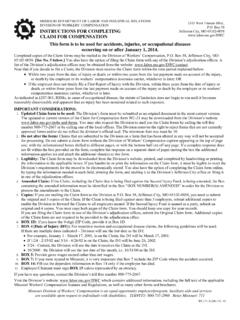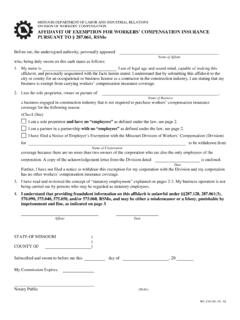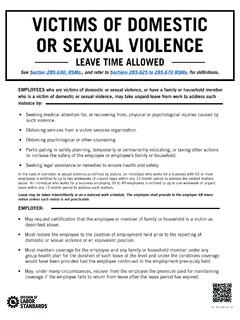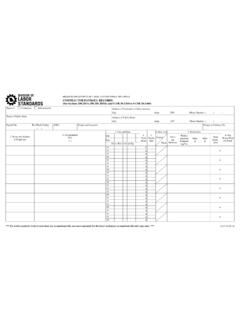Transcription of Information about Workers’ Compensation in Missouri
1 Facts for Injured Workers Information about Workers' Compensation in Missouri Table of Contents Work related 3. Workers 4. 4. Covered 4. Steps to Take When Injured on the 4. Benefits 5. Second Injury 8. Problems Receiving 9. Timeline for Filing a 9. What Happens After a Claim is 10. Additional 10. Division 11. This is a summary of the general provisions of the Missouri Workers' Compensation Law. For additional Information , contact an Information specialist at the Division of Workers' Compensation (DWC) at 800-775-2667. IMPORTANT: This pamphlet is not a complete statement of the workers'.
2 Compensation law. It should not be relied on to answer your legal questions. The workers' Compensation statutes will apply to determine the facts regarding your injury. 2. Work related injuries A work- related injury is a traumatic experience. If you are injured on the job or have been exposed to occupational disease in the course and scope of your employment, the Missouri Workers'. Compensation law can provide some relief from the worry and financial strain of being injured and possibly off work. Missouri law requires most employers to carry insurance, which pays for medical treatment and lost time benefits for employees who are injured on the job.
3 The law requires prompt payment of benefits at no cost to you if you sustain a work- related injury covered under the law. 3. Workers Covered Under the Missouri Workers' Compensation Law If you are employed in the construction industry, your employer must have workers' Compensation insurance, if the employer has one or more employees. Employers in other types of business must carry insurance if they have five or more employees. Railroad, postal and maritime workers are covered by federal laws. Exemptions The Missouri Workers' Compensation Law does not apply to employment of farm labor, domestic servants in private homes, occasional labor performed for private households, qualified real estate agents and direct sellers, certain unpaid volunteers, certain inmates and certain individuals working for amateur youth programs.
4 Covered injuries An injury must have arisen out of and in the course of employment. All injuries or occupational diseases must meet the standard of the accident or occupational exposure being the prevailing factor in causing both the resulting medical condition and disability. injuries for which the cause is unknown, such as idiopathic injuries , are not covered. Most injuries that occur when the employee is going to and from work are excluded. Steps to Take When Injured on the Job Report your injury. 1 Report any injury immediately to your employer or supervisor.
5 Failure to report your injury to your employer within 30 days of an accident or 30 days from the date of the diagnosis of an occupational disease or repetitive trauma may jeopardize your ability to receive workers'. Compensation benefits. Notify your employer in writing about the injury . including the nature of the injury, where and when it occurred and the name and 4. address of the person injured. If your employer has an Accident or Injury Report form, use it. If your employer does not have an Accident or Injury Report form, the Division of Workers' Compensation has a form on its website, Form WC-280, Report Your Workplace Injury/.
6 Occupational Disease or Repetitive Trauma Injury, that may be used to provide written notice to your employer, available at: www. This form should be given to your employer not the Division of Workers Compensation . Keep a copy of the notice you give to your employer for your records.*. Medical treatment. If you need to see a doctor for treatment 2 as the result of an injury on the job, you should tell your employer that you want to see a doctor. Under Missouri law, the employer has the right to select the treating doctor in workers'. Compensation cases.
7 Your employer or supervisor should arrange medical treatment and file the necessary reports with the Division of Workers' Compensation (DWC). 3. Visit for additional Information about the benefits available to you or the steps you may have to take in order to receive benefits. *After your employer files the First Report of Injury with the DWC, you should receive a letter from the DWC. The Notification of Rights letter will be sent to you if your injury results in lost time from work. If you do not lose time from work due to the injury, you will be sent a Medical-Only letter.
8 If you believe you have not received that letter in a timely fashion, please contact an Information specialist at 800-775-2667. Benefits Available Medical care All costs for authorized medical testing and treatment, prescriptions and medical devices are covered. There is no deductible and all costs are paid by your employer or its workers' Compensation insurance company. If you do receive a bill, contact your employer or its insurer immediately. The employer has the right to choose the treating physician or other healthcare provider. The employer and its workers' Compensation insurance company generally are not required to pay for treatment the employee seeks or selects without their authorization.
9 However, the employer and insurer may authorize you to see your own doctor. 5. You should check with the employer and its insurance company with respect to any medical treatment you seek. When an employee is required to submit to treatment at a place outside of the local or metropolitan area from the employee's principal place of employment, the employee is entitled to payment for necessary and reasonable expenses. In no event is the employer or insurer required to pay transportation costs of more than 250 miles each way from the place of treatment. In addition, the employer or insurer may offer physical rehabilitation services to assist you in returning to work.
10 This is an extension of medical treatment for example, physical therapy to strengthen muscles. Payments for lost wages Most injuries only keep you from working temporarily and you may be eligible for temporary total disability payments. If the doctor says that you are unable to return to work due to your injuries or you are off work recovering from a surgery, you may be entitled to temporary total disability ( TTD ). benefits. If the doctor states you can perform light or modified duty work and your employer offers you such work, you may not be eligible for TTD benefits.












